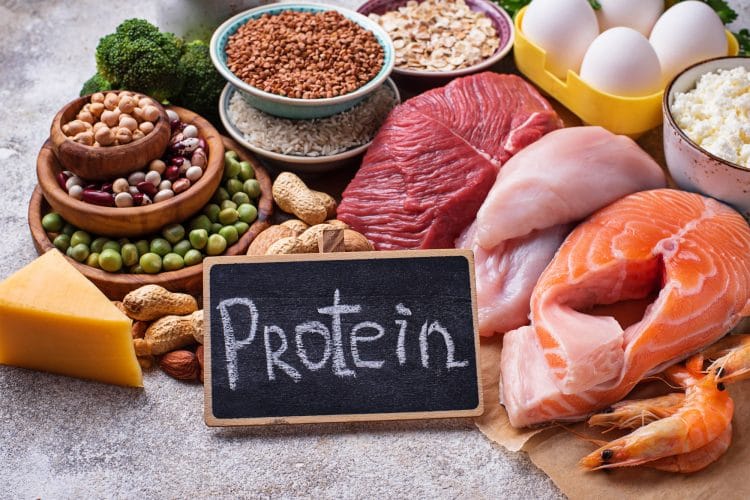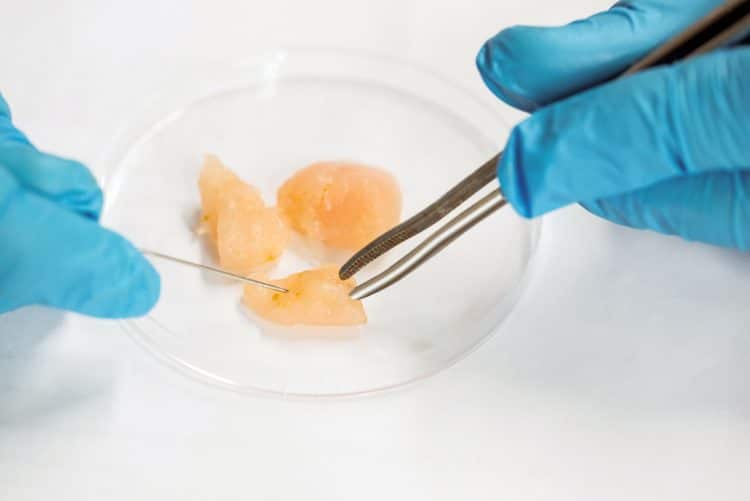If you want to build mounds of muscle or just look better in clothes, it’s necessary that you not only train for your goal/s but also follow an appropriate nutrition regime. Protein is the key nutrient for muscle growth and repair and ensuring adequate daily intake is non-negotiable. But the question everyone wants to know is how much protein to gain muscle.
Well, this is subjective. It doesn’t have to be rocket science (just science) though and really, you don’t even have to be precise. But you should do your best to ensure your muscles have plenty of building material. That’s not hard to do if you’re disciplined but anyhow, let’s get to the good stuff.
How Much Protein To Gain Muscle
For the purpose of this article, we’re assuming you do resistance training. It’s important to understand the difference because someone who does not work out will not need as much protein.


Gender, age, weight, genetics, general activity level, and training experience all play a role when it comes to determining the ideal amount of protein per individual.
While it would be impossible to combine these variables in an effort to figure the perfect protein dose, we can get a pretty good idea.
We know for certain that the dietary reference intake (DRI) of 0.36 grams of protein per pound (0.8 grams per kg) of body weight for men and women is not enough for people who train with decent intensity and are consistent in their efforts.
This equates to about 56 g/day for men and 46 g/day for women (yeah, not happening). That may be enough to prevent muscle loss but forget about making serious gains!
To build new muscle, there needs to be a positive nitrogen balance (1). This cannot happen if you’re training like a beast and eating 50 grams of protein per day.
It’s the training stimulus combined with consuming lots of muscle tissue-building amino acids including leucine that increases muscle protein synthesis; a process that is responsible for the gradual increase in muscle size.
Research on protein intake and muscle building
A commonly recommended protein intake range for preserving and building muscle is anywhere from 1.6-3.1 g/kg/day based on various literature (2, 3).


Regarding the ideal protein intake on a meal by meal basis, “recent literature from 2018 concluded that the ideal strategy for protein intake if the goal is muscle building, is to eat 0.4 g/kg/meal across a minimum of four meals in order to reach the minimum recommendation of 1.6 g/kg/day. However, an upper daily intake of 2.2 g/kg/day spread out over four meals of 0.55 g/kg/meal has also shown to be an effective approach” (4).
Besides the common differences between individuals that determine an appropriate protein intake, the goal of each person is a big determining factor.
For example, if you’re trying to lose body fat, being in an energy or caloric deficit naturally has catabolic effects on muscle tissue. Therefore, it’s wise to increase protein intake to maintain a positive nitrogen balance and preserve and in some cases, build muscle tissue. A cutting phase isn’t the time to cut back on protein (5, 6).
Research on ideal protein intake for bodybuilders during contest prep explained that 2.3-3.1 g/kg (1.05-1.4g/lb) of lean body mass per day of protein is ideal for fat loss and muscle preservation (7).
On the other end, those looking to bulk up by increasing calories above maintenance will also need more protein to support and strength and size gains.
Protein calculator tool


While more experienced exercisers may have a good idea of how much protein is right for them, for many of you, it’s much easier to use our protein calculator tool that does all the work.
You simply choose the unit of measurements (inches or cm), select your gender, input your age, weight, and height, and choose your activity level.
After you hit calculate, the tool will provide an estimate of your daily calorie intake based on the information you inputted, and you’ll get protein intake recommendations based on the Center For Disease Control and Prevention (CDC) and American Dietetic Association (ADA).
Related: 6 Reasons Why You Aren’t Gaining Muscle Mass
Is More Better?


Of course, there’s always been a debate about the safety and effectiveness of higher protein intake.
However, it seems that more recent research supports higher protein diets to maximize muscle gains, preserve lean mass, and even decelerate muscle loss (sarcopenia) and increase bone density.
Concerns for a high-protein diet isn’t as much an issue for healthy individuals, but as with anything, being excessive with your intake isn’t recommended. However, there may be no advantage of consuming too much anyway (8).
According to research, up to 2g per/kg/bw/day long-term is typically safe for healthy adults while an upper intake of 3.5g per/kg/bw/day is supposedly safe for well-adapted individuals.
The takeaway: Your ideal protein intake depends on YOU!
Also read:
Wrapping Up
If you were wondering how much protein to gain muscle, then we hope this information was helpful. While experimenting is seldom a bad idea, especially if you’re strategic about it, our protein calculator offers a stress-free option that gives you a good estimate of your ideal protein intake.
Keep in mind though, that it’s such an individual thing, but the good news is that you don’t have to be on-the-dot perfect with your protein intake either. Use this information for reference and do your best and listen to your body.
References
- Stokes, Tanner; Hector, Amy J.; Morton, Robert W.; McGlory, Chris; Phillips, Stuart M. (2018-02-07). Recent Perspectives Regarding the Role of Dietary Protein for the Promotion of Muscle Hypertrophy with Resistance Exercise Training. Nutrients. 10 (2).
- Carbone, John W.; Pasiakos, Stefan M. (2019-05-22). Dietary Protein and Muscle Mass: Translating Science to Application and Health Benefit. Nutrients. 11 (5).
- Phillips, Stuart M.; Van Loon, Luc J. C. (2011). Dietary protein for athletes: from requirements to optimum adaptation. Journal of Sports Sciences. 29 Suppl 1: S29–38.
- Schoenfeld, Brad Jon; Aragon, Alan Albert (2018-02-27). How much protein can the body use in a single meal for muscle-building? Implications for daily protein distribution. Journal of the International Society of Sports Nutrition. 15.
- Mettler, Samuel; Mitchell, Nigel; Tipton, Kevin D. (2010-02). Increased protein intake reduces lean body mass loss during weight loss in athletes. Medicine and Science in Sports and Exercise. 42 (2): 326–337.
- de Souza, Russell J.; Bray, George A.; Carey, Vincent J.; Hall, Kevin D.; LeBoff, Meryl S.; Loria, Catherine M.; Laranjo, Nancy M.; Sacks, Frank M.; Smith, Steven R. (2012-03). Effects of 4 weight-loss diets differing in fat, protein, and carbohydrate on fat mass, lean mass, visceral adipose tissue, and hepatic fat: results from the POUNDS LOST trial. The American Journal of Clinical Nutrition. 95 (3): 614–625.
- Helms, Eric R.; Aragon, Alan A.; Fitschen, Peter J. (2014). Evidence-based recommendations for natural bodybuilding contest preparation: nutrition and supplementation. Journal of the International Society of Sports Nutrition. 11: 20.
- Publishing, Harvard Health. When it comes to protein, how much is too much?. Harvard Health. Retrieved 2021-04-09.
